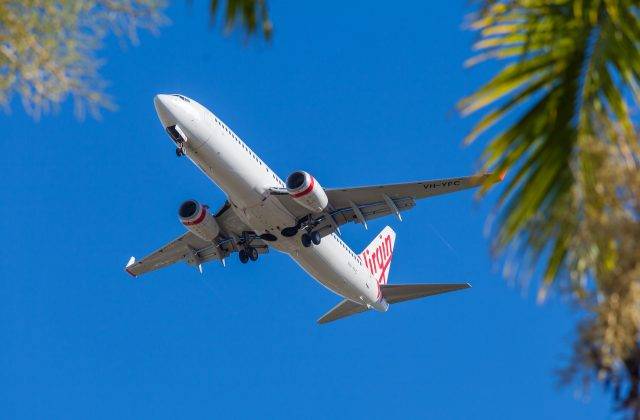Key points:
• Plan for a stronger, more profitable and competitive Virgin Australia coming out of voluntary administration
• Focus on delivering exceptional experiences at great value with Virgin Australia’s core domestic and short-haul international business
• Virgin Australia to provide customers with the value of travel credits post administration with validity dates extended for bookings made prior to administration
• Resetting Virgin Australia to meet lower global and Australian demand, including:
– Reduction in cost base to meet sector uncertainty and COVID-19 market conditions
– Securing approximately 6,000 jobs when the market recovers with 3,000 roles impacted
– Simplified all-Boeing 737 mainline fleet and the retention of the regional and charter fleet, but removing ATR, Boeing 777, Airbus A330 and Tigerair Airbus A320 aircraft types.
– Long-haul international flying important part of plan but suspended until global travel market recovers
– Tigerair Australia brand discontinued with Air Operator Certificate (AOC) retained to provide option for ultra-low-cost operations when market recovers.
– Continued commitment to regional and charter flying.
5 August 2020: The Virgin Australia Group (ASX: VAH) has announced a plan for a stronger, more profitable and competitive business, building on its unique culture and securing approximately 6000 jobs as it prepares to exit voluntary administration under the ownership of Bain Capital.
CEO COMMENTARY
Virgin Australia Group CEO and Managing Director Paul Scurrah said together with Bain Capital, the plan will help to re-establish Virgin Australia as an iconic Australian airline, bringing strong competition for travellers while securing approximately 6,000 direct jobs and indirect employment for more than 30,000 Australians.
“Our aviation and tourism sectors face continued uncertainty in the face of COVID-19 with many Australian airports recording passenger numbers less than three per cent of last year and ongoing changes to government travel restrictions,” said Mr Scurrah.
“Demand for domestic and short-haul international travel is likely to take at least three years to return to pre-COVID-19 levels, with the real chance it could be longer, which means as a business we must make changes to ensure the Virgin Australia Group is successful in this new world.
“In a country as big as Australia, strong competitive airlines are critical in helping restore the economy, which is why in the face of the worst crisis our industry has ever seen, a well-capitalised Virgin Australia Group with a solid and sustainable future is a great outcome for Australians and the nation’s economy.
“Even when we do see a return to pre-COVID-19 levels of travel, successful airlines will be influenced by demand and look very different than the way they did previously, requiring long-term capital, a lower cost base and be more focused on providing exceptional experiences through a combination of great people and world class technologies.
“Working with Bain Capital, we will accelerate our plan to deliver a strong future in a challenging domestic and global aviation market. We believe that over time we can set the foundations to grow Virgin Australia again and re-employ many of the highly skilled Virgin Australia team.
“Our initial focus will be on investing in the core Virgin Australia domestic and short-haul international operation alongside our 10-million-member strong Velocity Frequent Flyer program, continuing to offer an extensive network of destinations, a domestic lounge network and value for money for customers.
“Bain Capital recognises the importance of Virgin Australia’s loyal customers, and that’s why they will be provided the value of their travel credits post administration with validity significantly extended to ensure they have plenty of opportunity to book tickets to their favourite destinations.
“While these changes are important to manage the impact of COVID-19, they involve some very tough decisions. We expect approximately 3,000 roles will be impacted as a result of the changes announced today. However, our intention is to secure approximately 6,000 jobs when the market recovers with aspirations for up to 8,000 in the future. To those that leave the business, I want to thank them for the role they’ve played in making this a great airline. They will be closely supported through our alumni program, have all their entitlements honoured and be provided with a two-year extension of employee travel benefits and early access to retiree and long service benefits.
“Our people have shown incredible resilience under tough circumstances. They are what set the Virgin Australia Group apart and make us so unique. We hope to welcome many of them back as we start to grow again in the future.
“Virgin Australia has been a challenger in the Australian market for 20 years, and as a result of this plan and the investment of Bain Capital we are going to be in a much stronger position to continue that legacy.”
PLAN FOR A STRONGER VIRGIN AUSTRALIA GROUP
The plan is anchored around six key points:
1. Overhaul the cost base, and simplify everything, starting with the fleet
To build a successful airline, the Group will align costs with a depressed and uncertain revenue outlook, simplifying its fleet to realise cost efficiencies and remove operational complexity.
The Group will move to an all-Boeing 737 mainline fleet for domestic and short haul operations which will see the removal of ATR, Boeing 777, Airbus A330 and Tigerair Airbus A320 aircraft. The Group’s regional and charter fleet will remain, while the company reviews options at Virgin Australia Regional Airlines (VARA), including different operating models to support continued regional and charter flying.
The Group will also undertake a supplier contract review across its operations including products, services and facilities to better align with the company’s future size and requirements and lowering costs significantly.
Virgin Australia will consolidate its footprint and will move its corporate headquarters to 275 Grey Street in Brisbane’s Southbank. This follows a consolidation of its corporate offices in Sydney.
Long-haul international operations are an important part of the Virgin Australia business. However, given current international travel restrictions, the airline will continue to suspend flights to Los Angeles and Tokyo with the intention to recommence and grow long-haul flights when sufficient demand returns. Customers will continue to have access to international markets through the airline’s codeshare partners.
The Tigerair brand will be discontinued in the market as there is not sufficient customer demand to support two carriers at this time. Tigerair Australia’s Air Operator Certificate (AOC) will be retained to support optionality to operate an ultra-low-cost carrier in the future when the domestic market can support it.
2. Focus on customer value
Virgin Australia aims to be the best value carrier in the market, not a low-cost carrier. It will offer exceptional experiences at great value, regardless of purpose of travel. The airline will serve business travellers, including corporates and customers travelling for a holiday and visiting loved ones, and maintain a two-class cabin offering.
Virgin Australia will continue to offer choice and convenience through an extensive network of domestic and short-haul international destinations including frequent capital city connections and services to leisure and regional markets as part of the company’s future network plans. Virgin Australia will also maintain a network of lounges in key domestic locations with a plan to re-open when demand returns.
Virgin Australia currently operates a reduced network of services to 28 towns and cities across Australia and will continue to add destinations and frequencies in line with demand and to support the nation’s economic recovery from COVID-19.
Virgin Australia will continue to focus on delivering the best on-time performance and maintain an exceptional safety record and safety culture.
In response to COVID-19, Virgin Australia has introduced a range of health and wellbeing measures including a pre-departure eligibility questionnaire, contactless check-in, expanded social distancing measures, and more frequent cleaning onboard and at the airport.
3. Harness culture
The Group’s culture is unique and is the heart and soul of both the airline and Velocity Frequent Flyer. Over the past 12 months, the Group has gone to great lengths to unlock its culture and harness the spirit of its people. The Group will continue to reinvigorate the Virgin Australia brand and its passion for customer service, while embracing the diversity, talent and strength of its people.
4. Investment in world class digital and data technologies
The Group will invest significantly in the comprehensive digital re-platforming of both the airline and Velocity Frequent Flyer program. It will accelerate the Group’s vision for the future, to not only improve Virgin Australia’s commercial capability and guest experience, but significantly enhance the employee experience and increase the pace of profitable revenue growth, enabling faster and bigger job growth opportunities.
5. Strong balance sheet and investment capital for both transformation and growth
The Group will emerge from Voluntary Administration with a strong balance sheet, worthy of an investment grade rating, providing resilience and future growth potential.
Backed by Bain Capital, one of the world’s leading private investment firms with more than $AUD150 billion assets under management, Virgin Australia will have a strong balance sheet to withstand material future shocks to the industry.
6. Jobs and future growth
The Group’s people have shown extraordinary resilience during this uncertain period and the focus now is to preserve as many jobs in the immediate term as possible while building a business that is healthy and sustainable for decades to come.
As a result of the changes announced today, including the transition to a single Boeing 737 fleet for domestic and short-haul flying, it is expected approximately 3,000 jobs will be impacted, primarily across the operations functions, and corporate roles which directly support the operation. Formal consultation with unions and employee groups has commenced today, and all options including voluntary redundancy, redeployment, leave without pay and flexible work arrangements will be explored to retain as many jobs as possible.
While devastating for our people, making these changes now will secure approximately 6,000 jobs once market demand recovers, with potential to increase to 8,000 jobs in the future. Team members who remain stood down as the Group waits for domestic and international travel restrictions to ease, or are on Leave Without Pay, will continue to receive the JobKeeper payment until it expires in March.
All team members that leave the business will depart with care and respect. Their entitlements will be paid in full and the Group is working with over 100 partners to identify short and long-term redeployment opportunities.
TRAVEL CREDITS AND SUPPORT FOR GUESTS
Bain Capital understands customers and staff are at the heart of the Virgin Australia business. As an acknowledgement of this, all travel credits and Velocity Frequent Flyer points will be carried forward under its ownership.
Virgin Australia will provide customers with the value of their travel credits post administration. To preserve value for customers with credits for bookings made prior to administration, booking dates will also be extended to 31 July 2022 for travel until 30 June 2023. Further information about the use of credits will be provided to customers in due course.
Customers and travel agents will be notified directly of any flight cancellations associated with the announcements made today. Tigerair Australia customers and those affected by any cancellations will be provided a travel credit for use on Virgin Australia operated services.
VOTE OF CREDITORS
Deloitte Restructuring Services partners and Administrators Vaughan Strawbridge, John Greig, Sal Algeri and Richard Hughes were appointed on 20 April 2020. They have entered into a binding sale agreement for the business with Bain Capital and continue to work with Bain and Virgin Australia management on the restructuring of the airline.
With full support of Deloitte and Bain Capital, this plan will form part of a Deed of Company Arrangement (DOCA), which will be put to a vote at the second creditors’ meeting.
source: Virgin Newsroom




![China Southern: Auckland to London from $1507 Return [Feb-Jun] Tower Bridge, London](https://www.beatthatflight.com.au/wp-content/uploads/2018/05/cropped-tower-bridge-2324875_1920-e1548294311653-113x150.jpg)